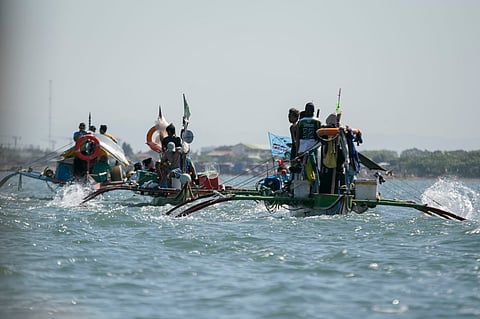
- NEWS
- the EDIT
- COMMENTARY
- BUSINESS
- LIFE
- SHOW
- ACTION
- GLOBAL GOALS
- SNAPS
- DYARYO TIRADA
- MORE

A small fisherfolk group urged the government on Tuesday to provide more fuel subsidies and increase its postharvest facilities to raise the livelihood of Filipino fishers in the West Philippine Sea amid the continuous harassment of Chinese authorities in the disputed waters.
According to the National Federation of Small Fisherfolk Organizations in the Philippines, or Pamalakaya, around 80 percent of the WPS fishers' income is now devoted to fuel, which is continuously rising in price.
“More than 70 percent of their income was lost. There was an increase in their production costs first, because of the constant increase in fuel. Second, the blocking and harassment by the Chinese Coast Guard (CCG). [The Filipino fishers] still need to negotiate with their government just to insist on their fishing; that's an extra cost. Instead of what it should be, when they arrive there, they are able to fish, but not because the Chinese Coast Guard is blocking them; they continue to spend a lot of money, which goes to fuel.” Pamalakaya National Chairperson Fernando Hicap told the DAILY TRIBUNE.
He went on by saying that Filipino farmers in the said area have experienced a decline in harvest since the beginning of Chinese aggressive actions in the area.
“What is really needed is production support. The fuel, the subsidy, and then the food...the postharvest facilities that should be with them should ensure the freshness of their catch before they go home because they are forced to go home when their ice runs out because it will rot. Even if they are in deficit, they will be forced to go home.”
According to Hicap, back then, fishermen had already gone home after fishing in the WPS for one week since they had harvested enough fish for the first semester.
But now, based on the reports their group received, due to the presence of CCG, Filipino fishermen stay at the WPS for a month or more.
On top of this, Hicap said that strengthening the Philippines' presence in the WPS is also a key to bolstering WPS fishermen.
He said that the Marcos administration should establish a permanent structure in the country's exclusive economic zone, benefiting the Filipino authorities and fishermen.
"For once and for all, the 24-hour operation of our law enforcers, who maintain that they are always visible, will also strengthen the courage of our fishermen. At the same time, those permanent structures will help so that they will not return home if there is bad weather, that is the safekeeping or resting place."
Hicap said that reports of WPS fishers having decreased fish harvests were already received by their group as early as 2020.
He added that besides the CCG's presence in the WPS, the competence in the way Filipino fisherfolk harvest also affects their yield, citing that commercial Chinese fishing boats have a sophisticated process of harvesting.
“It is such a bad and unequal benefit to the wealth of our fisheries that should be ours.”
The Bureau of Fisheries and Aquatic Resources said on Monday that they will provide fuel subsidies to Filipino fishers as part of their Livelihood Activities to Enhance Fisheries Yield and Economic Gains from the West Philippine Sea, or Layag WPS project.
Besides the provision of food and fuel, the government is also set to procure this year new floating assets such as monitoring, control, and surveillance patrol vessels and a food boat.
